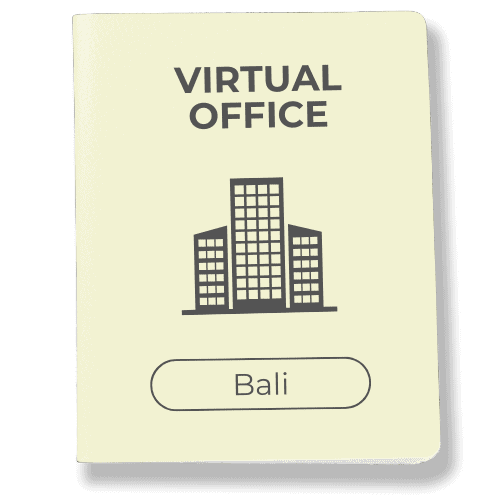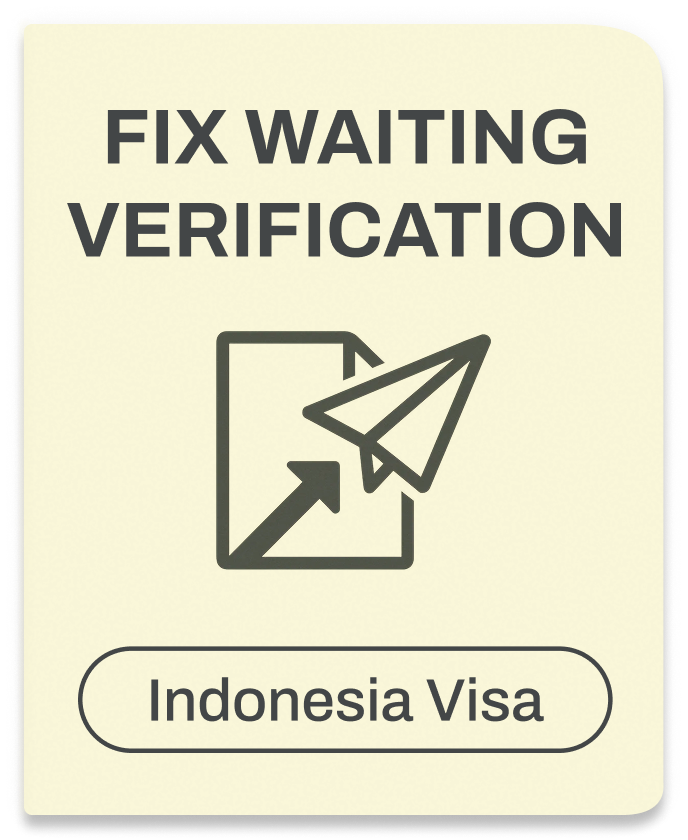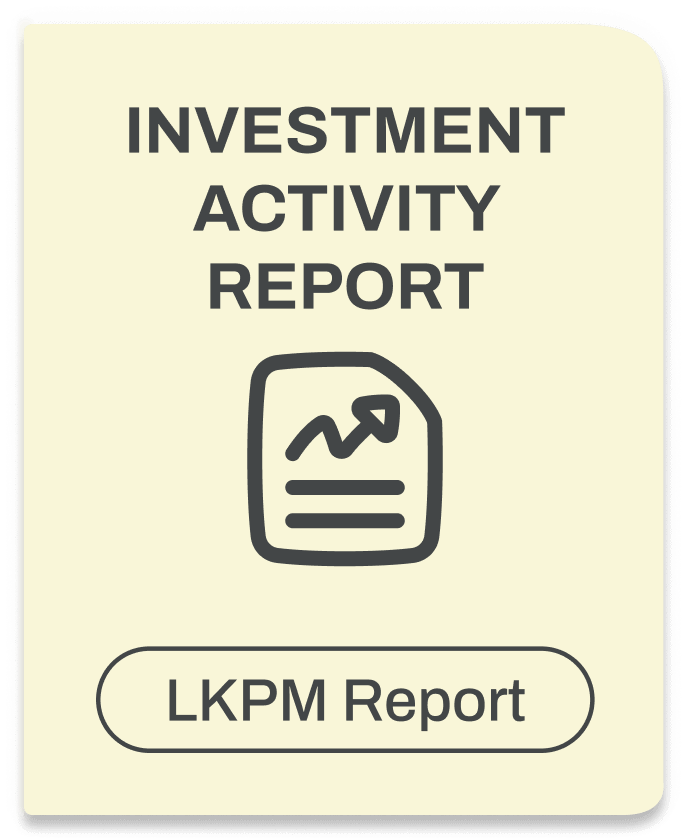Indonesia Average Salary (2025): Benchmarks, By City & Sector
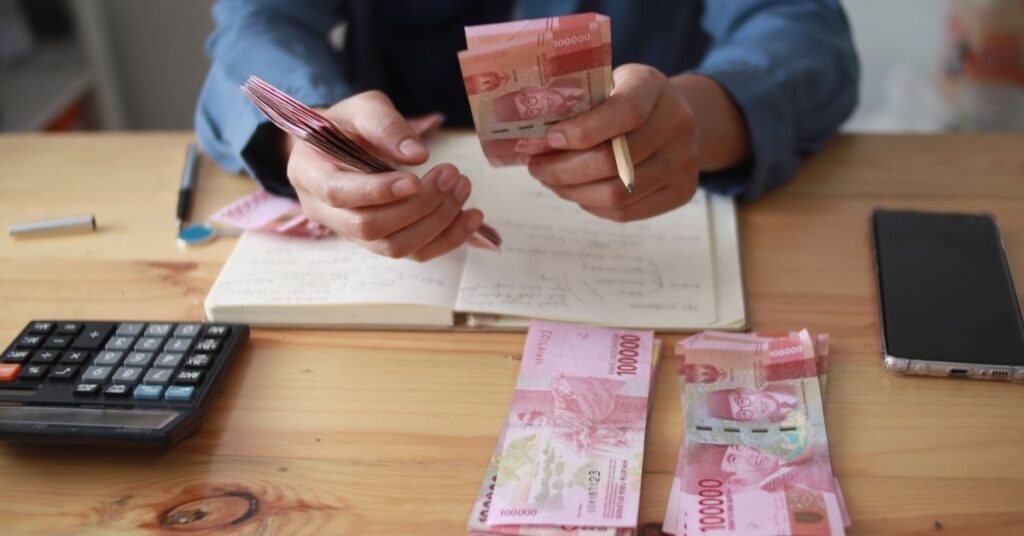
Looking for quick facts about Indonesia average salary? Here’s what you need to know about average monthly salary in the country right now:
- National average (formal employees): IDR ~3.09 million/month (February 2025, net average monthly wage)
- Minimum wage context (UMP 2025): Jakarta leads at ~IDR 5.39M, Bali sits at ~IDR 3.00M, but average salary in Indonesia varies significantly across provinces
- Key drivers of variation: Your province/city location, industry sector, education level, and job type determine salary range differences
[View Methodology: Data sourced from Badan Pusat Statistik Indonesia (BPS) through Sakernas survey]
What “Average Salary” Means (and What It Doesn’t)
Before we explore salary in Indonesia, let’s clear up confusion about average monthly salary calculations. When people ask about average salary, they often mix up several different concepts.
Net vs. gross matters more than you think for monthly salary comparisons. The IDR 3.09 million figure we mentioned? That’s net, what actually hits workers’ bank accounts after deductions. Gross average wages look bigger but don’t reflect real spending power for employees.
Mean vs. median salary tells different stories about wages. The mean (mathematical average) gets skewed by higher average salaries from top earners. If ten employees earn IDR 3 million and one earns IDR 30 million, the mean jumps to IDR 5.45 million. But nine out of ten workers still earn just IDR 3 million. That’s why understanding salary comparison requires the full picture.
Here’s the big catch: BPS (Badan Pusat Statistik) data covers formal employees only. Indonesia has millions of informal workers, street vendors, gig drivers, small shop owners, who often earn differently than salaried employees in companies. This creates perception gaps between official statistics and what many workers actually experience in the job market.
BPS collects average monthly wage data through Sakernas (National Labor Force Survey). When we say “February 2025,” that’s when surveyed workers reported their earnings. Think of it as a snapshot of the country’s economy, not a yearly average.
Indonesia’s National Picture (2025)
The numbers reveal interesting trends about average salary in Indonesia right now. Formal sector workers earned an average monthly salary of IDR 3.09 million in February 2025. That represents 1.78% year-over-year salary increases compared to February 2024.
But context matters for salary comparison. Compared to August 2024 figures, we’re seeing momentum in average wages. Indonesian salaries often fluctuate throughout the year due to bonus cycles, agricultural seasons, and tourism patterns in different provinces. The February reading gives us a solid baseline without holiday distortions.
What does 1.78% growth really mean for workers? It’s modest but positive salary increases. With inflation running at similar levels, real purchasing power has stayed roughly stable for formal employees. That’s neither great nor terrible, it’s steady progress for the country’s economy.
Indonesia varies significantly from other Southeast Asian nations in wage structure. While countries like South Korea show higher average salaries, Indonesia’s developing countries status and low labor costs create different dynamics. However, the country is experiencing rapid growth in certain sectors.
[Chart would show: 18-month trend line with IDR/USD toggle option]
Minimum Wage vs. Average Salary, Don’t Confuse Them
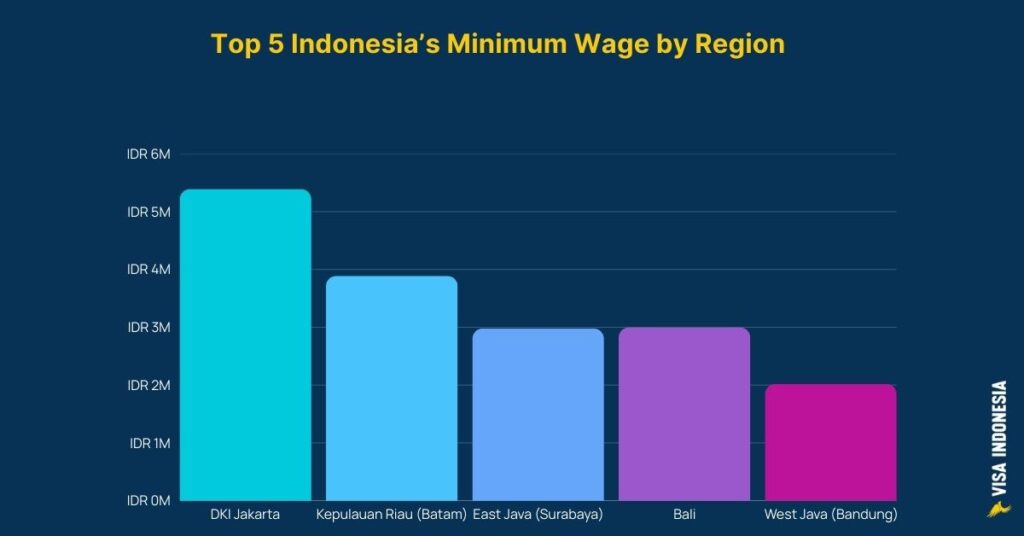
Here’s where salary comparison gets confusing. Indonesia’s UMP (Upah Minimum Provinsi) and UMK (Upah Minimum Kabupaten/Kota) are legal minimum wage standards set by the Indonesian government. They’re not the same as actual average monthly salary in the job market.
Think of minimum wage as the legal floor for employers. Many skilled workers earn above it, some unfortunately earn below it (especially in informal sectors), and minimum salary requirements vary dramatically by location. This creates several factors affecting actual pay.
2025 UMP highlights for salary comparison:
- Bekasi (highest minimum salary): ~IDR 5.6 million
- Bali: ~IDR 3.00 million
- Several provinces still below IDR 2.5 million minimum wage
The gap between minimum wage and average salary tells you about local job opportunities. Jakarta’s high minimum salary reflects cost of living and political pressure. But remember: just because Bekasi’s UMP is IDR 5.6 million doesn’t mean most workers earn exactly that amount.
Indonesia varies significantly from other Southeast Asian nations in minimum wage policy. While some countries maintain national level standards, Indonesia allows different provinces to set rates based on local factors.
Warning: Minimum wage ≠ market salary. Use minimum salary as reference, not prediction of actual earnings.
[Sticky widget would show: “Your city UMP vs. reported average” comparison]
By Province & Major Cities (2025 Snapshot)
Average salary in Indonesia varies significantly by location, creating different salary range opportunities across the country. Here’s what the data shows for major cities and provinces:
| Province/City | 2025 Minimum Wage | City Average Monthly Salary* | Notes |
| DKI Jakarta | IDR 5.39M | IDR 4.2-6.8M | Finance/tech hub with higher average salaries |
| Kepulauan Riau (Batam) | IDR 3.89M | IDR 3.5-5.2M | Manufacturing center, skilled workers premium |
| East Java (Surabaya) | IDR 2.98M | IDR 3.1-4.8M | Industrial diversity, growing economy |
| Bali | IDR 3.00M | IDR 2.8-4.5M | Tourism-dependent, seasonal variations |
| West Java (Bandung) | IDR 2.02M | IDR 2.5-4.2M | Mixed economy, lower cost of living |
| Central Java | IDR 2.18M | IDR 2.3-3.8M | Manufacturing base, steady job opportunities |
Salary ranges reflect formal sector BPS data plus market observations
Jakarta remains Indonesia’s leader for higher average salaries, driven by finance, technology, and multinational companies. The capital’s job market supports premium wages but demands higher education levels and skills from employees.
Major cities like Batam benefit from proximity to Singapore and strong manufacturing presence. Many workers here serve export-oriented businesses, creating demand for skilled workers at competitive average monthly wage levels.
Surabaya and East Java offer Indonesia’s most diverse industrial base. From traditional manufacturing to emerging sectors, the region provides steady job opportunities for workers at various education levels.
Urban centers vs. rural areas show dramatic salary comparison differences. While major cities offer higher average salaries, the cost of living also rises proportionally.
[Sortable table with search function; footnotes indicate data freshness and gaps]
By Industry & Education Level
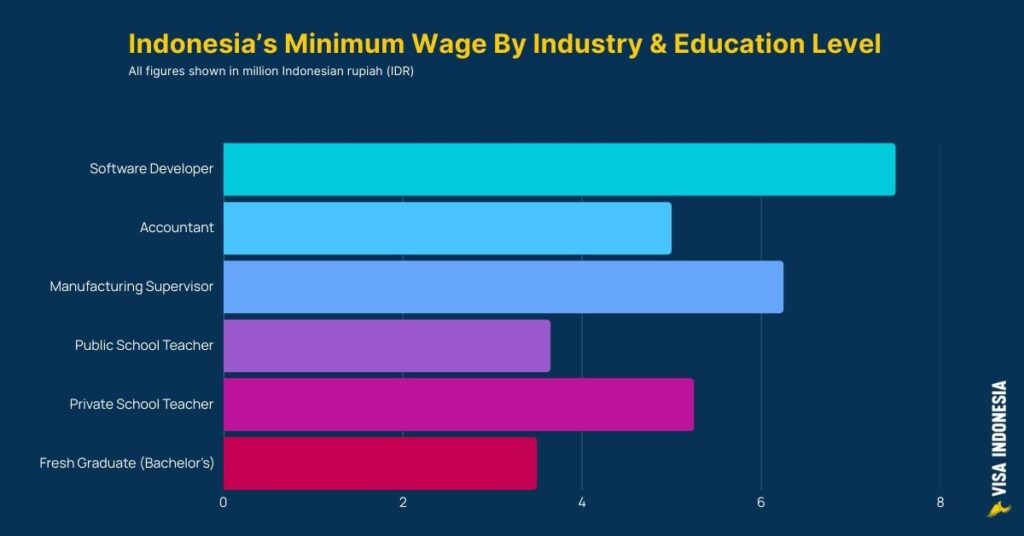
Your industry choice dramatically affects salary range potential in Indonesia’s job market. Here’s what BPS data reveals about average wages across different sectors:
Higher Average Salaries by Industry
Top-paying industries for skilled workers:
- Finance and insurance lead salary comparison charts, often paying 40-60% above national average
- Manufacturing (especially automotive and electronics) offers competitive average monthly wage to skilled workers
- Services sector (IT, consulting) shows strong growth and higher average salaries
- Outsourcing industry provides job opportunities with international pay standards
Stable but lower-paying sectors:
- Agriculture remains Indonesia’s largest employer but offers limited salary increases over time
- Retail and wholesale employ many workers but typically pay closer to minimum wage levels
- Traditional services fluctuate with the country’s economy and tourism cycles
Education Level Impact on Average Salary
Bachelor’s degree makes a measurable difference in Indonesian wages. Workers with bachelor’s degree typically earn 35-50% more than those with high school education. This education premium varies by industry and job type.
Fresh graduate salaries often start near minimum wage but grow rapidly with experience in skilled positions. Companies increasingly demand higher education levels for better-paying roles.
The education level premium varies significantly by sector. In finance and services, advanced degrees command substantial premiums. In agriculture or traditional manufacturing, experience often matters more than formal education for determining average monthly salary.
[Two bar charts would show: Industry wage differentials and Education level premiums, with hover tooltips for sample sizes]
Role Benchmarks (Practical Ranges)
Job seekers need practical salary comparison data. Here are realistic salary range options for common job roles in Indonesia’s formal sector:
Professional & Technical Roles
Software Developer: IDR 4.5M – 12M/month
Typical average monthly salary: IDR 7.5M (Jakarta), IDR 5.5M (other major cities)
High demand for skilled workers drives competitive wages
Source: BPS ICT sector data + market synthesis
Accountant: IDR 3.2M – 8M/month
Average monthly wage: IDR 5M (Jakarta), IDR 4M (smaller cities)
Finance sector offers stable job opportunities
Source: BPS financial services sector
Manufacturing Supervisor: IDR 3.5M – 9M/month
Skilled workers in manufacturing earn competitive average salary
Source: BPS manufacturing sector
Education & Public Service
Public School Teacher: IDR 2.8M – 4.5M/month
Government employees receive standardized salary increases annually
Source: BPS education sector data
Private School Teacher: IDR 3.5M – 7M/month
Higher salary range based on school prestige and location
Entry-Level & Fresh Graduate
Fresh Graduate (Bachelor’s Degree): IDR 2.5M – 4.5M/month
Starting salaries vary by industry and company size
Job opportunities in major cities offer higher starting wages
Important note: Salary ranges marked as “BPS-aligned sectors” come directly from official statistics. Market synthesis ranges blend official data with industry observations and may be less precise.
Purchasing Power & Cost-of-Living Reality Check
Raw average salary numbers don’t tell the complete story about workers’ living standards. IDR 10 million monthly salary creates very different lifestyles depending on location and cost of living.
In smaller cities like Surabaya, IDR 10 million supports comfortable middle-class living. Workers can afford decent housing, reliable transportation, regular dining out, and savings. Many employees in East Java’s industrial centers achieve this salary level.
In urban areas like Jakarta, that same IDR 10 million faces higher cost pressures. Housing consumes larger budget portions, commuting expenses run higher, and social expectations push spending upward. You’re still middle-class, but margins feel tighter for workers.
Urban centers vs. rural areas present stark salary comparison realities. Tourist destinations demand Jakarta-level prices for housing and dining, but other costs remain moderate. Remote workers with major city salaries often find smaller locations attractive for this reason.
Several factors affecting cost of living:
- Housing typically consumes 25-40% of average monthly salary, varying dramatically by location
- Transportation costs depend heavily on infrastructure and vehicle ownership
- Food expenses range from very affordable (local options) to expensive (international dining)
- Healthcare and education represent significant budget items for employees and families
The key insight for salary comparison? Earnings discussions always need local context. What matters isn’t just average monthly wage amounts, but how far those rupiah stretch in actual living situations.
[Link to cost-of-living calculator would appear here]
Trends to Watch (2025)
Several important trends are shaping average salary in Indonesia as the country’s economy moves through 2025.
Salary increases versus inflation remains the central story for workers. With inflation running close to wage growth rates, real purchasing power stays roughly flat for most employees. This creates political pressure for higher minimum wage but also challenges businesses managing labor costs.
Job market evolution continues as Indonesia experiences rapid growth in certain sectors. The Indonesian government’s digitization efforts and expanded social insurance programs encourage more workers into formal arrangements. This trend should boost official average wage statistics over time.
Sector hiring signals show interesting patterns affecting salary range opportunities:
- Manufacturing remains stable with modest growth, driven by export demand
- Services and outsourcing sectors show accelerated hiring through early 2025
- Agriculture faces ongoing productivity challenges affecting wages
- Finance sector maintains competitive salaries for skilled workers
Regional development creates new job opportunities outside major cities. As businesses expand to smaller cities, they bring higher average salaries to previously low-wage areas. This helps address Indonesia’s significant regional salary variations.
Education and skills demand intensifies across industries. Companies increasingly require bachelor’s degree minimums, and skilled workers command growing premiums over basic positions. Fresh graduates with relevant skills find better starting salary ranges than previous years.
Comparison with Southeast Asia: Indonesia’s position among Southeast Asian nations continues evolving. While countries like South Korea maintain higher average salaries, Indonesia’s rapid growth and expanding job market create increasing opportunities for workers.
2025 minimum wage adjustments were relatively modest across most provinces, reflecting economic caution. Most increases fell between 2-4%, roughly tracking inflation expectations while supporting low labor costs for businesses.
BPS release schedule: Average wage data updates monthly through Sakernas, with comprehensive analysis published biannually. The next major labor market report arrives mid-2025, providing deeper sectoral and regional breakdowns for salary comparison.
For job seekers and workers, 2025 looks like a steady year rather than breakthrough for salary increases. Focus on education level improvements and skilled positions to maximize earning potential in this developing economy. The job market rewards workers who adapt to Indonesia’s changing economic landscape.
Salary Sorted. Now Secure Your Visa
You’ve crunched the numbers. You know what the average salary looks like, what it buys in Jakarta versus Bali, and how far your rupiah will really stretch. But here’s the kicker: none of that matters if you can’t legally live, work, or invest here.
That’s where we come in.
At Visa-Indonesia.com, we take the red tape, the paperwork, the “where-do-I-even-start” stress, and turn it into a clear, step-by-step path. Whether you’re landing a job in Jakarta, building a business in Bali, or eyeing a second home in paradise, we help you get the right visa without the headaches.
Ready to Apply or Extend Your Visa?
Let our visa specialists handle your application.








